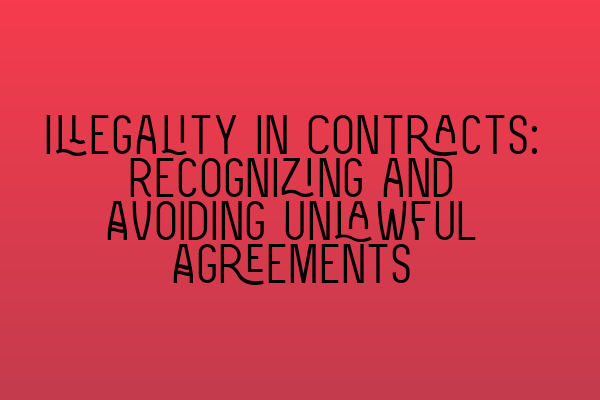Illegal contracts: Recognizing and Avoiding Unlawful Agreements
Contracts are an essential part of the business world, governing various legal transactions and obligations. However, not all contracts are valid and enforceable. In fact, some contracts may be deemed illegal and unenforceable by courts of law. Recognizing and avoiding unlawful agreements is crucial to protect your interests and ensure compliance with legal requirements. In this article, we will explore the concept of illegality in contracts, discuss common scenarios where contracts may be considered illegal, and provide tips on how to avoid entering into unlawful agreements.
What is an illegal contract?
An illegal contract is a legally unenforceable agreement due to its violation of statutory or common law principles. Such contracts are considered void ab initio, meaning they have no legal effect from the onset. While each jurisdiction may have its own specific laws regarding illegal contracts, they generally fall into distinct categories, including contracts against public policy, contracts without legal capacity, and contracts to commit illegal acts.
Contracts against public policy
Contracts that are contrary to public policy are one of the most common types of illegal agreements. Public policy refers to the principles and standards recognized by society as being essential for the common good. Contracts that violate public policy are typically those that promote illegal activities, encourage deception, or infringe upon fundamental rights and values.
For example, a contract to sell illegal drugs would be considered illegal as it promotes criminal conduct. Similarly, an agreement to engage in fraudulent activities or to discriminate against a protected class of individuals would not be enforceable due to their violation of public policy.
It is important to note that not all agreements that are against public policy are automatically deemed illegal. Courts will consider the specific circumstances and balance various factors to determine if a contract should be void. Seeking legal advice in such cases is crucial to fully understand the potential risks and consequences.
Contracts without legal capacity
Another category of illegal contracts involves agreements made by individuals or entities lacking the legal capacity to enter into a contract. Minors, individuals under the influence of drugs or alcohol, and individuals with mental incapacity are generally considered to lack legal capacity. Additionally, contracts entered into by corporations exceeding their stated purpose or acting beyond their authority may also be deemed illegal.
If a contract is entered into with someone without legal capacity, it may be considered void or voidable at the option of the incapacitated party. However, in some cases, the law may provide certain protections to the party lacking capacity, allowing them to enforce the contract.
Contracts to commit illegal acts
Contracts that involve the commission of illegal acts, also known as unlawful contracts, are void and unenforceable. Such agreements are generally seen as contrary to the fundamental principles of legality and public order. For example, a contract to commit a crime, engage in bribery, or violate trade restrictions would be considered illegal.
Avoiding illegal contracts
To avoid entering into illegal contracts, it is essential to exercise due diligence and take certain precautions. Here are some tips to help you recognize and avoid unlawful agreements:
1. Seek legal advice: Engaging the services of a qualified solicitor who specializes in contract law is crucial. They can review your contracts, identify potential issues, and provide guidance on compliance with legal requirements.
2. Conduct thorough background checks: Before entering into any agreement, it is essential to research the other party involved. Ensure they have the legal capacity and authority to enter into the contract and verify their reputation and previous business dealings.
3. Review the terms of the contract: Pay close attention to the terms and conditions of the contract. Ensure they are clear, specific, and in compliance with applicable laws and regulations. Any provisions that appear ambiguous, unfair, or contrary to public policy should raise red flags.
4. Stay updated on legal developments: Laws and regulations are dynamic and subject to change. Stay informed of any legislative or judicial developments that may impact the legality of your contracts. Regularly review and update your contract templates to ensure compliance with current legal requirements.
By prioritizing compliance with legal requirements and consulting legal professionals when needed, you can minimize the risks of entering into illegal contracts and safeguard your interests.
In conclusion, recognizing and avoiding illegal contracts is essential for any business or individual entering into agreements. Understanding the various categories of illegality, such as contracts against public policy, contracts without legal capacity, and contracts to commit illegal acts, is the first step in ensuring compliance with the law. Taking proactive measures such as seeking legal advice, conducting background checks, reviewing contract terms, and staying updated on legal developments will help mitigate the risks associated with unlawful agreements.
For more information on contract law and preparation for the SQE exams, check out our related articles:
– SQE 1 Practice Exam Questions
– SQE 1 Practice Mocks FLK1 FLK2
– SQE 2 Preparation Courses
– SQE 1 Preparation Courses
– SRA SQE Exam Dates
Remember, a sound understanding of contract law is essential for any legal professional, ensuring compliance, protecting client interests, and enabling successful legal practice.
